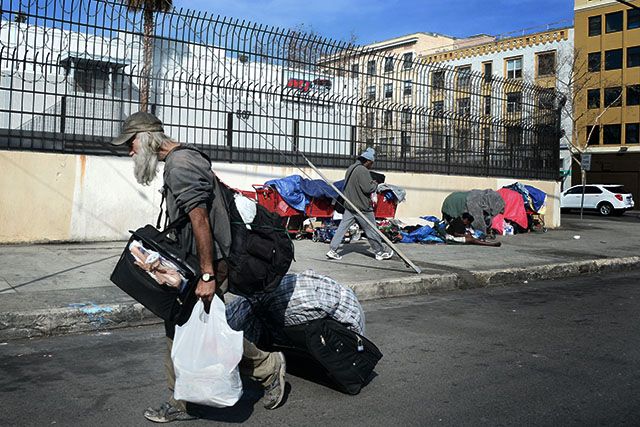In early October, LA City Officials deigned to void over a million old citations, warrants, and tickets in an effort to supposedly “unclog” the court system. The plan was called the “Fugitive Misdemeanant Recovery Program” and it was officially enacted to save the courts money, allow the police more time to focus on fighting real crime, and to put an end to the ceaseless cycle of arrests and debts that plagued the most underprivileged Angelenos. Now, over a month later, the first two of the alteration’s goals may be coming along nicely, but the third seems to be something of a non-starter.
Indeed, it’s become clear that this program touting “amnesty” is resulting in anything but for Los Angeles’s already badly underserved homeless community. LAPD Chief Michel Moore stated that the department is not planning on putting a halt to citations for violations pertaining to “quality of life,” which can include offenses as minor as leaving a tent open in public during daytime hours, sleeping in public parks during the night, or loitering near certain “protected” areas, such as schools, playgrounds, and even ATMs. As such, the city’s judgeship will also continue handing out bench warrants for homeless individuals, all of which can result in a three-hundred dollar “civil assessment” for those who are unable to pay their citations.
Warrants for the above-mentioned group are part of the reason LAPD’s arrests of the homeless spiked by over 30 percent since 2016, particularly since most people living on the street will inherently have a hard time paying tickets or traveling to attend court. Statistically, 90 percent of homeless individuals who were cited in 2017 never showed up in front of a judge. As such, almost all citations given to the homeless are bound to transform into arrest warrants. And, worse still, even one day in jail for people in such dire straits could easily end in the loss of all their worldly property and belongings.
Despite these minor infractions creating a backlog in the local justice system, with some small-time offenders boasting upwards of ten active citations at once, there are still many in the City’s legal sphere who feel punitive measures must be upheld. Per LA City Attorney Mike Feuer: “We need, as a city, to assure that public spaces are safe and accessible for everyone. We are trying to strike an important balance here.” But, in practice, Feuer struck a different tone when his amicus brief suggested that the US Supreme Court hear an appeal against the landmark Martin v. the city of Boise case, which stops areas lacking sufficient shelter space from making arrests on individuals for sleeping outside. If this decision were repealed, the LAPD would be granted sweeping new authority to step up their arrest quota in this arena.
Other major cities, like San Francisco, are moving further away from enforcing punishment for the “crime” of living outdoors. Way back in 2015, SF judges stopped handing out bench warrants for quality of life tickets altogether, labeling the crisis one of “behavioral health,” rather than anything regarding the criminal sphere. Meanwhile, in 2016 alone, the LAPD arrested upwards of 14,000 homeless people for these non-violent offenses, and the number has likely risen since then. While it’s clear that some penalties are needed to dissuade those intent on breaking the law, it seems unfair to grant amnesty for some smaller citations, while still cracking down on those who need leniency the most. Hopefully, in the months to come, LA can live up to the promise of the Fugitive Misdemeanant Recovery Program in an effort to guide the homeless community itself towards recovery — rather than jail. Unfortunately, as of now, however, the much-publicized measure seems more like a stop-gap publicity opportunity.
Written by:Dash Finley
Photo: Fredrick J. Brown





